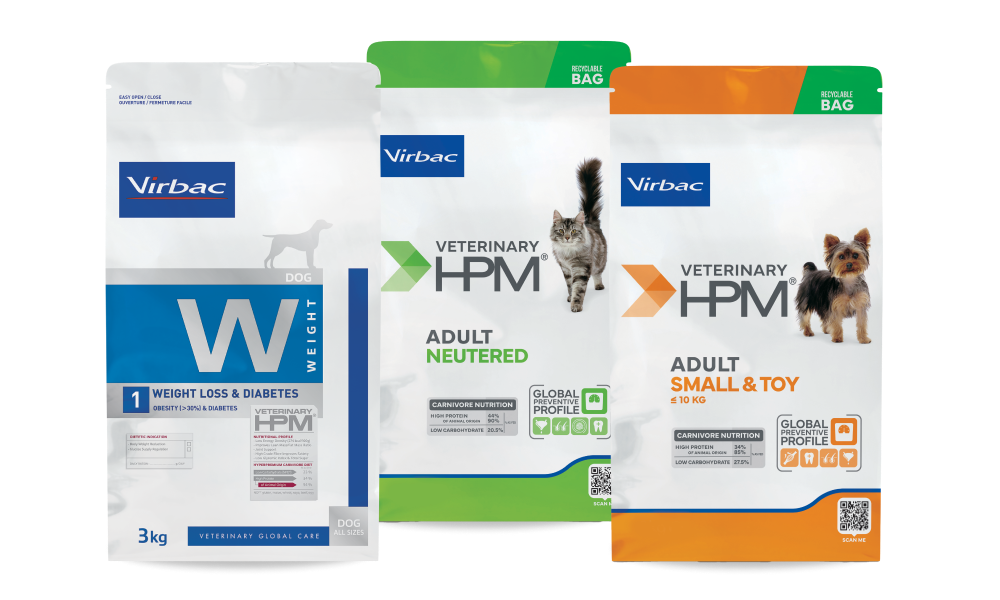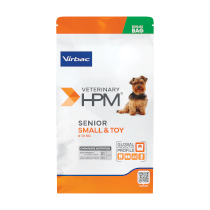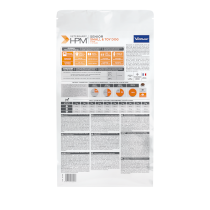Senıor Dog Food - Small & Toy
Diş sağlığı üzerindeki etkinliği kanıtlanmış alglerden elde edilen doğal bir bileşen olan Ascophyllum Nodosum ile dişleri hedef alan yeni bir formül geliştirilmiştir.
Köpeğiniz yaşlandıkça gereksinimleride değişir. VETERINARY HPM® olgun küçük ırk köpeğinizin özel gereksinimlerini karşılar.
- 10 yaşından büyük küçük ırk köpekler için (<10kg)
- 12 yaşından büyük minyatür ırk köpekler (<5kg) için
- Aşırı kilo alma riskini sınırlandırır
- Tartar oluşumunu sınırlar ve iyi bir ağız ve diş sağlığı sağlar
- Sağlıklı böbrek fonksiyonlarını ve üriner sistemi korur
- Yeni 2'si 1 arada olan çözüm artık onlara gelişmiş ağız ve diş bakımı ile gelişmiş beslenme sağlamaktadır.
Mevcut ambalajlar:
- 1,5 kg
VETERINARY HPM ™, köpeklerin beslenme ihtiyaçlarına daha yakın olacak şekilde tasarlanmış yeni nesil bir köpek mamasıdır. Bu yeni ve benzersiz seri, düşük karbonhidrat-yüksek protein formülüne dayanmaktadır. Bu yüzden nişasta ve karbonhidrat içeriği çok daha düşük ve hayvansal protein içeriği çok daha yüksektir. Sonuç, köpeğinizin ihtiyaçlarına mükemmel şekilde uyarlanmış bir beslenmedir.
Kurutulmuş domuz ve kümes hayvanı proteinleri, Pirinç (min. %4), Hidrolize domuz ve kümes hayvanı proteinleri, Bakla kabuğu, Lignoselüloz, Bezelye, Hayvansal yağlar, Patates nişastası (min % 4), Mineraller, Keten tohumu, Pancar küspesi, Balık yağı, Psyllium lifi (Plantago (L.) spp.), Fruktooligosakkaritler, Bira mayası (betaglukan kaynağı), Hidrolize kabuklular (kitosan kaynağı), Lactobacillus acidophilus, Kondroitin sülfat.
VETERİNER HPM® hiçbir suni tatlandırıcı veya renklendirici içermez.
Analitik bileşenler :
(verildiği gibi %)
| Analitik bileşenler (verildiği gibi %) |
|
|---|---|
| Nem | 9 % |
| Protein | 32 % |
| Hayvansal proteinin bitkisel proteine oranı | 84/16 |
| Yağ | 14 % |
| Mineraller | 6,5 % |
| Ham selüloz | 9,5 % |
| NFE * | 29 % |
| Nişasta | 22 % |
| Kalsiyum | 1,1 % |
| Fosfor | 0,7 % |
| Sodyum | 0,4 % |
| Omega-6 | 2,2 % |
| Omega-3 | 0,9 % |
| Hesaplanmış ME** | 327 kcal/100g |
| İn vivo ölçülmüş ME** | 332 kcal/100g |
| * Azot İçermeyen Ekstrakt Karbonhidratlar ** Metabolize edilebilir enerji |
|
| Fonksiyonel Bileşenler | |
|---|---|
| Yumurta zarı | 300 mg/kg |
| Hiyalüronik asit | 100 mg/kg |
| Bentonit | 5 g/kg |
| Ölü Laktobasiller | 7 mg/kg |
| L-karnitin | 330 mg/kg |
| Pentasodik Trifosfat | 0,35 % |
| Kondroitin sülfat | 430 mg/kg |
| Chitosan | 430 mg/kg |
| Vitaminler ve eser elementler | |
|---|---|
| A Vitamini | 11 000 IU/kg |
| D3 Vitamini | 1 100 IU/kg |
| E Vitamini | 570 mg/kg |
| B1 Vitamini | 3,8 mg/kg |
| B2 Vitamini | 11 mg/kg |
| B3 Vitamini | 30 mg/kg |
| B5 Vitamini | 26 mg/kg |
| B6 Vitamini | 3 mg/kg |
| B9 Vitamini | 0,48 mg/kg |
| B12 Vitamini | 0,062 mg/kg |
| Kolin | 740 mg/kg |
| Taurin | 1 500 mg/kg |
| Bakır | 15 mg/kg |
| Demir | 25 mg/kg |
| İyot | 1,1 mg/kg |
| Çinko | 120 mg/kg |
Miktar tablosuna uyulması ve her zaman taze su bulundurulması tavsiye edilir.
| Köpeğin ağırlığı (kg) | Günlük Miktar (g/gün)* | ||
|---|---|---|---|
| Düşük Aktivite | Normal Aktivite |
Çok Aktif |
|
| 1 | 40 | 45 | 45 |
| 2 | 60 | 70 | 75 |
| 3 | 80 | 90 | 100 |
| 4 | 95 | 110 | 120 |
| 5 | 115 | 125 | 140 |
| 6 | 130 | 140 | 155 |
| 7 | 140 | 155 | 175 |
| 8 | 155 | 170 | 190 |
| 9 | 165 | 185 | 205 |
| 10 | 180 | 200 | 220 |
| * Bu miktarlar yaklaşık değerlerdir, köpeğin ırkına ve aktivite seviyesine bağlı olarak değişebilir. Daha fazla bilgi için lütfen veteriner hekiminize danışın. | |||

- Yavru köpeğimi ev yemeği ile besleyebilir miyim?
Yavru köpeklerin ilk yılları boyunca aldıkları besinlerin iskelet, kas ve tüm yeni dokuları oluşturmak için enerji ve madde sağlaması gerektiği açıktır. Ancak beslenme bununla sınırlı değildir: yavru köpeklerin tam olarak işleyen bir sinir sistemi ve etkili bir bağışıklık sistemi geliştirmelerine de yardımcı olmalıdır. Bu çok hassas dönemde temel besin maddelerinde (hayvanın vücudu tarafından sentezlenemeyenler) herhangi bir eksiklik, köpeğin gelecekteki sağlığını etkileyebilir.
Yavru köpekleri için beslenme açısından dengeli bir ev yemeği hazırlamak isteyen köpek sahipleri için veteriner hekim beslenme uzmanları tarafından geliştirilen birçok tarif mevcuttur. Bununla birlikte, gerekli tüm koşullara uymayı başarmak yanıltıcıdır; çünkü ev tipi bir rasyonun besin dengesi çeşitli tehlikelere tabidir. Sahibi her zaman tarifi tam olarak takip etmekte zorlanacaktır, gerekli malzemeler her zaman mevcut değildir ve malzemelerin besin bileşimi ürünün kaynağına bağlı olarak önemli ölçüde değişebilir. Ev yemeği hazırlarken hiçbir laboratuvar analizi, kullanılan hammaddelerin besin bileşimini doğrulayamaz!
Bu nedenle, bir mineral ve vitamin takviyesi ile birlikte olsa bile, köpekler için ev yapımı yemekler genellikle bazı temel besin maddeleri açısından eksiklikler gösterir.
- Yavru köpeğimi vejetaryen bir diyetle besleyebilir miyim?
Köpek bir etoburdur, bu da ihtiyaç duyduğu bazı besinlerin bitki bazlı bir diyetle sağlanamayacağı anlamına gelir. Bu tür diyetler, sağlık üzerinde ciddi sonuçları olan büyük beslenme eksikliklerine neden olabilir. Bu nedenle, yavru bir köpek asla vejetaryen bir diyetle beslenmemelidir.
- Yavru köpeğimi çiğ et ile besleyebilir miyim?
Çiğ et (kırmızı et veya tavuk) genellikle kalsiyum ve fosfor açısından yetersizdir. Kalsiyum/Fosfor oranı, özellikle kemik büyümesi açısından köpek türleri için tamamen uygunsuzdur. Böyle bir diyet, sağlık üzerinde ciddi sonuçları olan önemli beslenme eksikliklerine neden olabilir. Yavru köpek, yalnızca çiğ etle beslendiğinde küçük travmalarda bile patolojik kırık riskine maruz kalabilir.




